We will tell you about the eight most unpleasant and repulsive handshakes in the world. Try to avoid them like fire.
1. “DEAD FISH” Authority rating: 1/10
No greeting causes such unpleasant feelings as a “dead fish”, especially if the other person’s hand turns out to be cold and sticky. Shaking a soft, sluggish palm is unpleasant to almost everyone. Most people associate such a handshake with a weakness of character - after all, the hand of the interlocutor is so easily transferred to a subordinate position. However, cultural differences should also be taken into account here - in some Asian and African countries, a lax handshake is considered the norm, and a strong hand is an insult. In addition, every twentieth inhabitant of the Earth suffers from a disease called hyperhidrosis. This is a hereditary disease, accompanied by increased sweating. Such people should always carry a handkerchief or napkin with them in order to have time to wipe their hands before shaking hands.
There are more sweat glands on the palms than on any other part of the body, therefore it is very difficult to hide sweaty palms. It is surprising that many of those whose handshake can be called "dead fish" are not aware of this. Ask friends what they can say about your handshake to avoid embarrassment at upcoming business meetings.
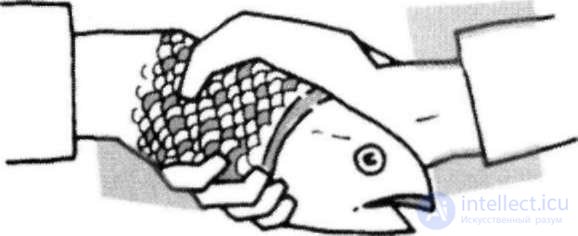
"Dead Fish" 2. TOO STRONG HANDMADE Authority rating: 4/10
Businessmen are often guilty of this. Too strong a handshake betrays the desire for domination and the immediate establishment of control in the relationship. The hand is stretched palm down, and then follows several energetic shaking. At the same time, the hand of the interlocutor is compressed with such force that blood circulation stops in the hand. Sometimes, people who feel weak and afraid to fall under the control of interlocutors shake hands like that.
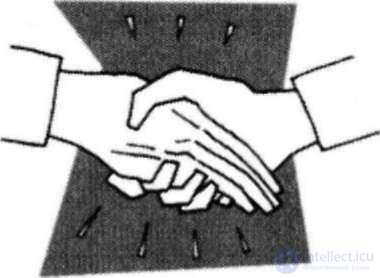
Too strong handshake 3. CHASTOL Authority rating: 0/10
Very close to a too strong handshake is the Kostol handshake. Such a technique is capable of scaring to death and never forgotten. However, it produces the proper impression only on the initiator himself. A bone-breaking handshake is characteristic of overly aggressive people who, without warning, use their advantage in physical strength and try to demoralize the interlocutor, turning his fingers into a mess. Women should not wear rings on the right hand, because among business partners there can always be such a bone breaker, and then you will have to hold a business meeting in a state of shock.
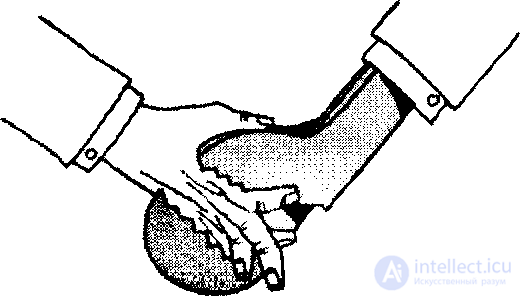
"Kostolom" Unfortunately, to resist such a handshake is impossible. If it seems to you that a person is doing this intentionally, you can attract the attention of others to his act, saying: “Oh! You hurt me. Your handshake is too strong! ”Thus you will let the initiator understand that such behavior is unacceptable.
4. THE PRESS OF THE FINGER'S TIPS Authority rating: 2/10
Such a handshake is most common during the greeting of a woman and a man. One of the interlocutors already removes his hand, and the second nothing remains but to shake only the tips of the fingers. Although the initiator may relate to the other person warm enough, but at the same time, he lacks confidence. In such circumstances, the main purpose of shaking fingers is to keep the other person at a comfortable distance. Shaking fingertips is often due to differences in the definition of personal space. This can happen if the personal space of one person is 60 cm, and the other has 90 cm. Naturally, the second interlocutor prefers to keep a greater distance, and hands during the greeting can not connect in the right way.
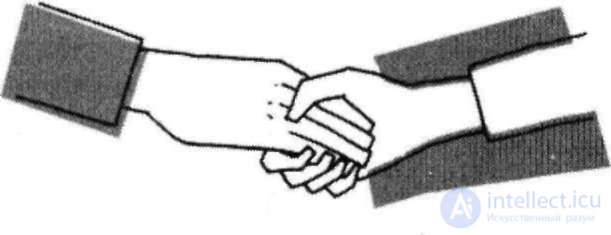
Shaking fingers If this happens to you, grab the other person’s right hand with your left hand, and shake it right with your right hand. At the same time, say with confidence: “Let's try again!” The handshake should be equal, it will increase your credibility. The interviewee will understand that you recognize its importance.
5. DIRECT HANDLE PUSH Authority rating: 3/10
Like a palm push down, push with a straight hand speaks about the aggressiveness of the interlocutor. The main goal of such a handshake is to keep the interlocutor at a distance, preventing them from entering their personal space. Such a handshake is often encountered in rural areas, since in nature the personal space of a person expands and he is ready to defend his territory.
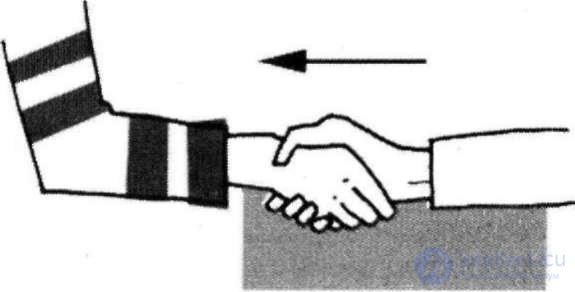
Push with straight arm In such a situation, people can even lean forward and balance on one leg, just to keep a comfortable distance for themselves.
6. PULLING Authority rating: 3/10
In power games, another type of handshake is often used, from which tears come out in front of our eyes, and in extreme cases it may end in a torn ligament. The initiator of the handshake squeezes the outstretched palm of the interlocutor, at the same time making a sharp leap toward himself, trying to drag the other person into his own territory. As a result, the interlocutor may lose balance, and the relationship will be hopelessly flawed.

Pulling Pulling the interlocutor into the territory of the initiator can pursue three goals. Firstly, it is possible that the initiator feels confident only inside his personal space. Secondly, the initiator may relate to a culture where personal space is very small. Thirdly, he may seek to establish full control over the interlocutor, depriving that balance. In any case, he seeks to conduct a conversation on his own terms.
7. PUMP HANDLE Authority rating: 4/10
The initiator of the handshake grabs the interlocutor's hand and begins to shake it vigorously and rhythmically in the vertical direction. In such a situation, no more than seven shakes are permissible, but the initiator of such a handshake may lose control of himself and continue to shake the other person’s hand, as if pumping water from the column.
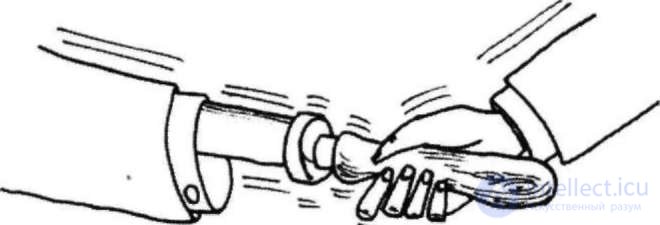
Pump handle Sometimes the initiator of the handshake stops shaking the hand of the interlocutor, but does not release it so that he will not accidentally run away. It is interesting that only a few try to free themselves. Physical contact weakens willingness to stop talking.
8. DUTCH HANDMADE Authority rating: 2/10
Such a handshake originated in the Netherlands, where it was compared with a bunch of carrots. Something it resembles a "dead fish", but somewhat stronger and not so sticky.
Today in Holland such a handshake is called a “dirty towel”. We believe that other explanations are superfluous.
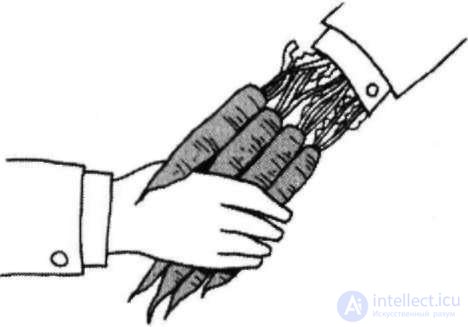
Dutch handshake 







Comments
To leave a comment
Body language
Terms: Body language